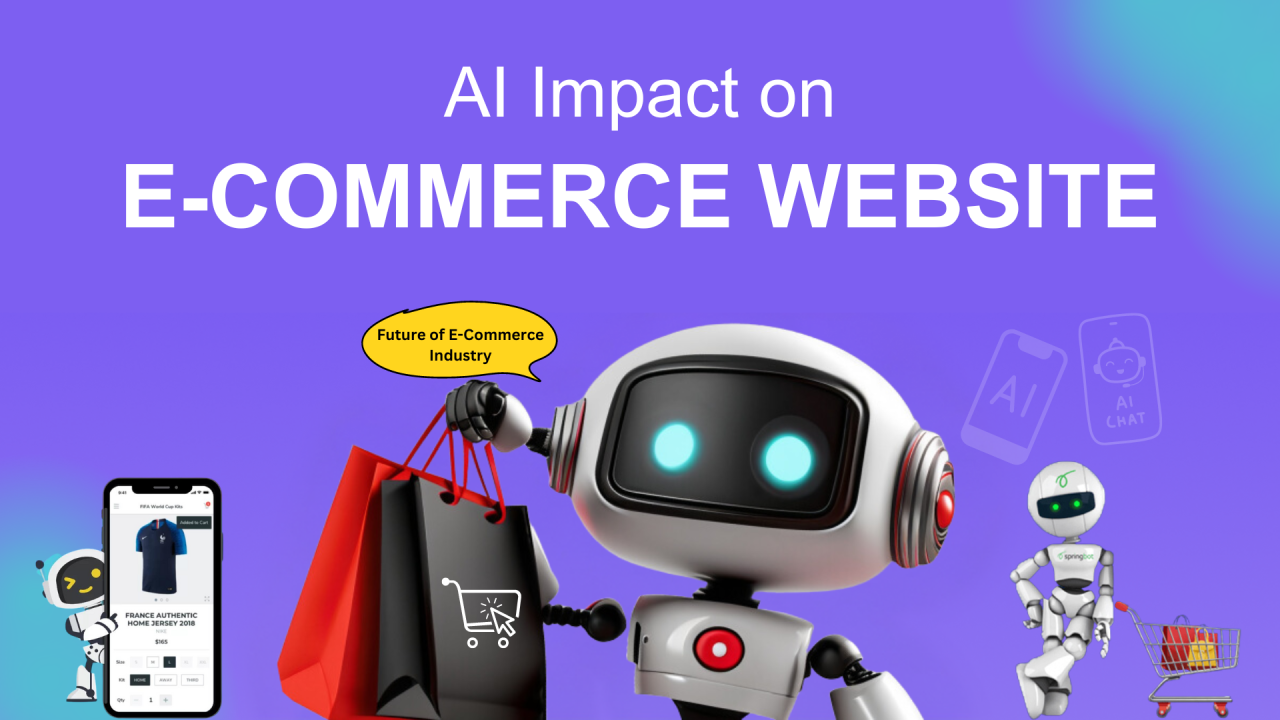As technology advances at an unprecedented pace, Artificial Intelligence (AI) is revolutionizing various industries, and e-commerce is no exception. AI is reshaping online businesses’ operations, transforming customer experiences, and driving innovation. In this article, we’ll explore the impact of AI on the future of e-commerce development, examining key areas where AI is making a difference and what we can expect in the coming years.
1. Personalized Shopping Experiences
One of the most significant impacts of AI in e-commerce is its ability to deliver personalized shopping experiences. AI algorithms analyse customer data, such as browsing history, purchase behaviour, and preferences, to tailor recommendations for individual shoppers.
Product Recommendations
AI-powered recommendation engines, used by platforms like Amazon and Netflix, suggest products based on customer preferences and past interactions. These systems increase customer satisfaction and encourage repeat purchases by showcasing products most relevant to each user.
Personalized Marketing
AI also enables more targeted and personalized marketing strategies. By analyzing user data, businesses can send personalized emails, notifications, and product suggestions at the right moment, boosting conversion rates. This leads to a more effective and efficient customer journey, driving both engagement and sales.
2. AI Chatbots and Virtual Assistants
AI-powered chatbots and virtual assistants are becoming increasingly popular in the e-commerce space, providing 24/7 customer support and enhancing user experiences.
Enhanced Customer Support
AI chatbots can handle a variety of customer queries, from order tracking to product inquiries, in real-time. These bots are programmed to respond quickly and accurately, reducing the need for human intervention and cutting down response times.
Seamless Shopping Assistance
Virtual assistants like Siri, Alexa, and Google Assistant allow users to make purchases using voice commands. This shift towards voice commerce simplifies the shopping process and makes it more convenient, especially on mobile devices.
3. Inventory and Supply Chain Optimization
AI is also transforming the way businesses manage their inventory and supply chains, leading to greater efficiency and cost savings.
Predictive Analytics
AI uses predictive analytics to forecast demand, helping businesses stock the right products at the right time. By analyzing sales data, trends, and external factors (such as holidays or weather), AI can accurately predict demand, reducing overstocking and stockouts.
Automated Warehousing
AI-driven robotics and automation are streamlining warehouse operations. Robots can manage inventory, pack orders, and even ship products without human intervention. This increases operational efficiency and allows businesses to scale rapidly without a proportional increase in labor costs.
4. Dynamic Pricing
Another game-changing aspect of AI in e-commerce is dynamic pricing. AI algorithms can automatically adjust prices based on demand, competition, and customer behavior, ensuring that businesses remain competitive while maximizing profits.
Real-Time Price Adjustments
AI can monitor competitors’ prices in real-time and adjust your prices accordingly. For instance, if a competitor lowers their price, AI systems can react instantly to offer competitive pricing or promote your product with special offers.
Customer-Specific Pricing
AI can also personalize pricing based on customer behavior. Loyal customers may receive special discounts, while new visitors might see introductory offers designed to entice them to make a purchase.
5. Improved Fraud Detection and Security
Security is a major concern for e-commerce businesses and consumers alike. AI is playing a critical role in enhancing fraud detection and improving overall online security.
Fraud Detection Algorithms
AI systems can analyze vast amounts of transaction data and detect suspicious activities, such as fraudulent purchases or unauthorized access. By identifying unusual patterns, AI can flag potentially fraudulent transactions in real time, protecting both businesses and customers from financial losses.
Enhanced Payment Security
AI-powered authentication methods, such as biometric verification (fingerprints, facial recognition), are making online payments more secure. These advanced systems are reducing the reliance on traditional passwords, which are often vulnerable to hacking.
6. Visual Search and Image Recognition
In 2024 and beyond, visual search will continue to gain momentum in e-commerce. AI’s ability to recognize and analyze images is revolutionizing how consumers discover products online.
Image-Based Search
With AI-powered visual search, customers can upload photos of products they like, and the system will return similar items available for purchase. Platforms like Pinterest and Google are already utilizing this feature, making it easier for shoppers to find exactly what they’re looking for.
Augmented Reality (AR)
AI-driven AR tools are allowing customers to “try before they buy.” For example, customers can use their smartphone cameras to visualize how a piece of furniture will look in their home or how clothes will fit them virtually. This reduces the chances of returns and enhances the overall shopping experience.
7. AI-Driven Content Creation and Product Descriptions
In the future of e-commerce, AI will play a pivotal role in content creation, helping businesses automate the process of writing product descriptions, blog posts, and even social media content.
Automated Copywriting
AI tools like GPT are already capable of generating high-quality product descriptions based on limited input. This can significantly reduce the time and effort required for businesses to maintain up-to-date and relevant product information on their websites.
Product Tagging and Categorization
AI can also automate the process of tagging and categorizing products, making it easier for customers to find what they need. This ensures that product listings are accurate, complete, and optimized for search engines.
8. Customer Behavior Analysis and Predictive Insights
AI excels in analyzing customer behavior and providing businesses with valuable predictive insights. These insights enable companies to make data-driven decisions and optimize their operations.
Predicting Customer Preferences
By analyzing historical data, AI can predict which products a customer is likely to buy in the future. This allows businesses to optimize their inventory, improve product recommendations, and create targeted marketing campaigns that resonate with individual customers.
Behavioral Analytics for UX Improvement
AI can track and analyze how customers interact with an e-commerce website, providing insights into where users drop off, which products they view, and how they navigate the site. With this data, businesses can make informed decisions to improve the user experience (UX) and reduce cart abandonment.
Conclusion: The Future of AI in E-Commerce
The impact of AI on e-commerce is profound, and its influence will only continue to grow in the coming years. From personalization and dynamic pricing to inventory management and fraud detection, AI is transforming every aspect of online retail. Businesses that embrace these technologies will be better positioned to thrive in the competitive landscape of 2024 and beyond.









